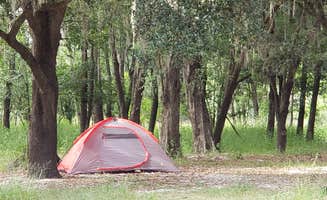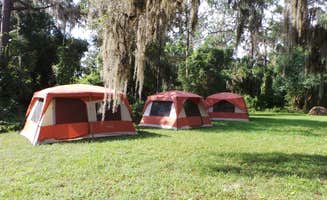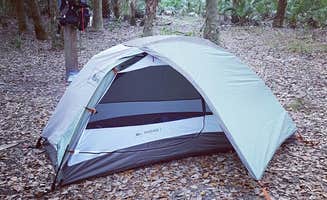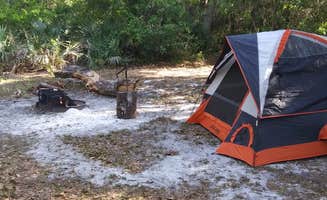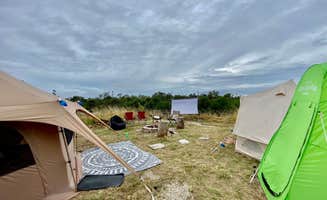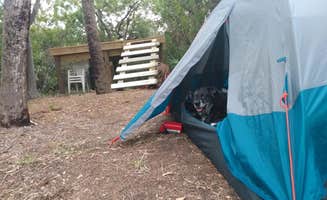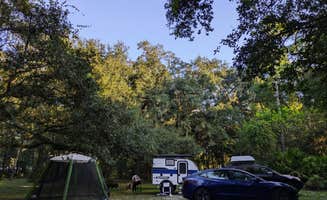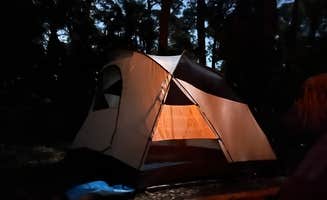Tent camping options in the Ona, Florida region extend beyond established campgrounds into conservation areas and primitive sites. Located in Hardee County, Ona sits in central Florida's inland region with a subtropical climate characterized by hot, humid summers and mild winters. Flash flooding can occur during the summer rainy season, so campers should check weather forecasts and water levels before setting up at riverside campsites.
What to do
Wildlife viewing opportunities: At Myakka River State Park, primitive campsites offer excellent locations for spotting native wildlife. A camper described it as "the ultimate adventure getaway" with "Floridas wildest animals. Panthers, hogs and alligators. Bring a flashlight and hide your food at night but dont forget to listen and look for these amazing creatures."
Fossil hunting: The Peace River region at Oak Hill Campground provides unique opportunities for finding prehistoric shark teeth. One visitor reported, "Make sure you get a shovel and sleuth to find some snark teeth. We found over 100 just at the campsite alone."
Historical exploration: Several parks feature preserved pioneer structures and educational exhibits. The Crowley Museum and Nature Center offers a glimpse into Florida's past. A camper noted, "This is a very special location, holding lots of history in the pioneer area where there are multiple restored buildings from the late 1800's pioneers."
Water activities: Kayaking, canoeing, and swimming are popular in the area's rivers and springs. One camper at Oak Hill Campground mentioned, "Awesome place to camp without having to Carrier your equipment. When you get to the outpost you put your gear in the trailer and they drive it to the campsite for you. They drive you in a bus with the canoes and from there you paddle down to your campsite."
What campers like
Secluded primitive sites: Many tent campsites near Ona, Florida offer genuine wilderness experiences. At Alderman's Ford Conservation Park, a visitor appreciated that "The camp sites are hike in only. I LOVE this. Bring a manageable pack with everything you need. Sites were equipped with hammock posts, picnic table, and a fire pit."
Natural springs: Several camping areas feature natural springs for swimming. According to a camper at Lithia Springs Conservation Park, there's a "Nice spring to swim in for 2.00 a person. Most campsites are very shaded. Bathhouse are clean."
Trail variety: The region offers diverse hiking experiences through various ecosystems. A Myakka River State Park visitor explained, "The hike there alternated landscapes- prairies, swamps, foresty- so during certain areas it was very bleak and boring, but that's apart of it!"
Spacious campsites: Many locations provide ample space between sites. A Lithia Springs visitor noted, "The sites are nice and spacious, have really excellent tree coverage (this is a MUST during Florida 'summers')."
What you should know
Water availability: Not all primitive sites have reliable water sources. A Myakka River camper advised, "Bee Island, Oak Grove, and Honore campsites have working pitcher pumps at them. Water from these pumps will need to be filtered or treated. Prairie and Panther Point Camps aren't guaranteed to have water, so you should bring your own."
Reservation requirements: Some parks don't accept reservations. A visitor to Lithia Springs observed, "This camp does not allow reservations but had quiet a few empty lots. Ranger seemed nice and helpful."
Distance to facilities: Many primitive tent sites require significant hiking to reach bathrooms or water. At Alderman's Ford, "There is no water, power, or restrooms at the sites. There is a restroom facility about a 1/2 mile down the trail."
Seasonal concerns: Summer brings heat, humidity, and insects. A camper at Highlands Hammock State Park warned, "We had a bear visit the garbage bin during the night, so you'll have to pay attention to storing your food during the night."
Tips for camping with families
Choose sites with adequate space: Some campgrounds have tight quarters. A Highlands Hammock visitor observed, "The campgrounds were nice but all campsites were too close to each other."
Consider noise levels: Some areas experience significant road noise. An Alderman's Ford camper mentioned, "Only downfall is that there is a lot of road noise throughout the entire night. Definitely took away from the 'nature' experience."
Look for easy trail access: For younger campers, select sites with manageable hikes. At Alderman's Ford, a family camper reported, "I stayed with 3 adults and 3 children under the age of 8. We stayed two night in 40 degree weather. This is a great place for families wanting to start out primitive camping!"
Check for ranger programs: Many parks offer educational activities. At Highlands Hammock, a visitor mentioned they "have lots of ranger-led activities like soup night, covered dish dinners, camper coffee, etc etc."
Tips from RVers
Site spacing considerations: Many campgrounds have limited space between sites. A Highlands Hammock camper noted, "The roads in the campground are a bit narrow, traffic can go both ways (even though they are only one lane!), and the dump station is not in the best place!"
Electric hookup availability: Not all sites offer full hookups. Check ahead for specific amenities needed.
Seasonal crowds: Popular parks fill quickly during winter months. A Highlands Hammock visitor advised, "Holiday weekends are insane and busy. Get reservations."
Access to supplies: Many campgrounds are near towns with stores. A Lithia Springs camper mentioned, "Grocery stores within 2 miles which was great because the wife ran out of wine."


